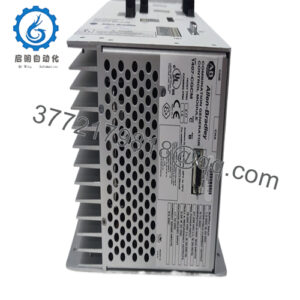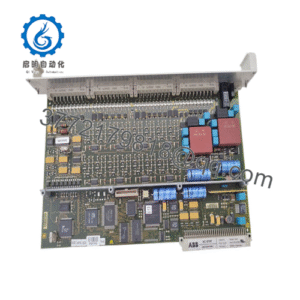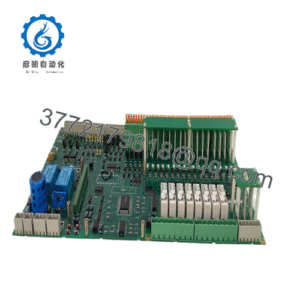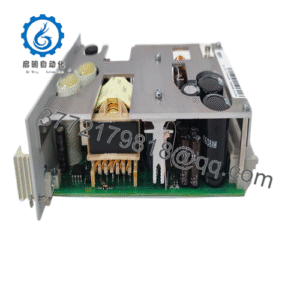Description
In the high-speed underbelly of industrial automation, where data latency between controllers can unravel synchronized operations—picture a motion control cell in automotive assembly where microsecond delays in shared memory cause axis desyncs and scrap surges, or a wind turbine farm where real-time sensor fusion across nodes falters under network jitter, risking blade pitch errors and structural fatigue—these bottlenecks erode precision and uptime in process control environments. Engineers often battle fragmented networks in legacy PLC or DCS setups, where standard Ethernet or Profibus chokes on reflective memory demands, leading to dropped packets, scalability walls, or diagnostic blind spots that inflate commissioning and maintenance costs in high-reliability applications. The GE ACC-5595-208 350-805595-208 emerges as a robust reflective memory hub assembly from GE Fanuc’s (now Abaco Systems) 5595 series, serving as the central router for deterministic, high-throughput data replication across distributed nodes, ensuring seamless I/O signal sharing in real-time deterministic networks.
This hub becomes indispensable in scenarios like expanding VMIC PCI-5565-based reflective memory rings, where star or hybrid topologies enable up to 256 nodes without latency spikes, or in aerospace simulators demanding fault-tolerant data mirroring for redundant controllers. In a semiconductor fab’s wafer handler, for instance, it orchestrates position feedback from multiple axes, filtering jitter to maintain sub-millisecond determinism and avert alignment faults that could ruin yields. For military C4I systems with rugged deployments, the GE ACC-5595-208 350-805595-208 supports single-mode fiber for long-haul links up to 10 km, upholding system stability amid EMI or vibration without signal regeneration losses. It’s particularly essential for modular integrations in multi-vendor environments, where its SFP transceiver flexibility bridges copper and fiber, aligning with goals of hot-plug scalability in dusty or thermal-variable enclosures.
What distinguishes it in process control is its emphasis on user-driven determinism: configurable from 1 to 8 ports in 1×8 or 2×4 modes, it auto-bypasses faulty nodes to preserve ring integrity, minimizing engineering tweaks for evolving topologies. In bandwidth-constrained plants or remote grids, its 2 Gb/s throughput quells congestion, while serial monitoring ports enable proactive health checks. For teams upgrading from VMIC-era networks, the GE ACC-5595-208 350-805595-208 simplifies persistence, reusing PCI-5565 footprints to defer full overhauls, redirecting focus from connectivity crises to performance peaks in industrial automation where data mirroring fuels every synchronized beat.
Weaving the GE ACC-5595-208 350-805595-208 into your network fabric positions it as the resilient router for reflective memory ecosystems, where it replicates data packets across fiber or copper links from VMIC-5565 cards, enabling shared-memory access for up to 256 nodes in ring, star, or cascaded hybrids. This hub integrates via SFP ports in 19-inch rack or desktop enclosures, anchoring at the transport layer—directly linking endpoint nodes but interfacing upward through serial or Ethernet for management oversight. In a stratified stack, it pairs with host PLCs like GE IC695 for collaborative control or downstream simulators for testbed mirroring, load-balancing traffic to evade single-link failures.
In motion, it regenerates optical signals to curb jitter below 100 ps, supporting multimode (up to 300 m) or single-mode transceivers for deterministic broadcasts at 2 Gb/s, while automatic bypass on invalid sync patterns keeps loops alive during node outages. Diagnostics pulse via front LEDs and RS232 ports, surfacing port stats or error counters in configuration tools for remote polling—crucial in process control where virtual dashboards outpace physical inspections. Lacking native redundancy beyond bypass, it scales via cascading for larger arrays, ensuring sub-1 µs latency in fault-tolerant rings, while universal power adapts to global standards without adapters.
This pliancy extends to varied topologies: populate only needed SFPs for lean configs, provision via serial commands for VLAN-like segmentation, and loopback-test integrity to benchmark against attenuation. For bus veterans, the GE ACC-5595-208 350-805595-208 uncomplicates replication, turning disparate nodes into unified mirrors that swell with endpoint counts, elevating industrial automation from laggy links to instantaneous ensembles.
| Specification | Details |
|---|---|
| Model Number | ACC-5595-208 350-805595-208 |
| Brand | GE Fanuc (Abaco Systems) |
| Type | Reflective Memory Hub Assembly (5595 Series) |
| Input Voltage | 85-264 VAC (Universal) |
| Operating Temp Range | -20°C to 70°C |
| Mounting Style | 19″ Rack / Desktop |
| Dimensions | 482 x 44 x 250 mm (1U Rack) |
| Weight | 4.3 kg |
| Interface/Bus | SFP Fiber (up to 8 Ports), RS232 Serial |
| Compliance | CE, RoHS, FCC |
| Supported Protocols | Reflective Memory Protocol (170 MB/s Deterministic) |
| Typical Power Draw | 25 W |
Opting for the GE ACC-5595-208 350-805595-208 equips your deterministic networks with unbreakable data symmetry that defies node volatility, its signal regeneration—holding jitter under 100 ps—mirroring payloads across 256 nodes to sustain 99.999% availability in rings where dropouts desync axes and halt lines. This mirroring curbs synchronization errors by buffering transients at line rate, steadying multi-CPU collaborations in apps where micro-delays mean defects, while flexible SFPs adapt to multimode for short hops or single-mode for sprawls, easing strain on cabling budgets in expansive plants.
The deployment dividend swells through VMIC compatibility, where it reuses PCI-5565 slots to reclaim fiber runs, compressing tie-ins from weeks to wiring checks and lightening opex in phased rings. Maintenance lightens via serial-embedded logs that chronicle faults for early reroutes, shortening hunts from cable chases to console queries—empowering teams to forecast link life rather than chase ghosts. Forged for grit in oily or humid bays, it clings to throughput over thermal cycles, postponing verifications and meshing with audit paces in compliant ops.
The broader horizon reveals efficiency multipliers—efficient 25 W draw slims UPS sizing, while port configurability defers hubs for leaner enclosures that flex with node growth. In high-reliability pursuits, the GE ACC-5595-208 350-805595-208 mitigates total frailties, from auto-bypass that orphans no node to supervision that baselines attenuation for spares, crafting a memory mesh that endures entropy in process control.
In aerospace ground simulators, the GE ACC-5595-208 350-805595-208 routes reflective data for flight model syncs, regenerating packets amid testbed EMI to anchor critical system uptime in process control environments where determinism averts scenario drifts. Its high-reliability SFP handling processes I/O signals from redundant hosts, ensuring glitch-free rehearsals.
Defense radar arrays deploy it for sensor fusion under vibration in mobile vaults, overseeing star-ring hybrids for nonstop tracking—delivering bypass schemes that uphold signal purity and continuous uptime in tactical bays. In high-speed rail signaling, it mirrors trackside data against packet storms in wayside holds, supporting modular endpoint expansions. These integrations position the GE ACC-5595-208 350-805595-208 as a replication ruler in arduous, sync-vital industrial automation, where hub mastery meets endurance.
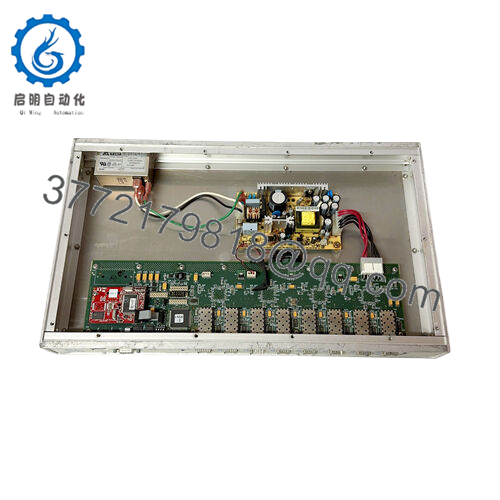
ACC-5595-208 350-805595-208
ACC-5595-204 350-805595-204 – Copper variant for short-range Ethernet-based reflective networks in compact setups.
VMIC PCI-5565 350-5565-000 – Endpoint card companion for PCI host integrations with memory mapping.
ACC-5595-210 350-805595-210 – Rack-optimized model with extended SFP for 16-port cascades.
VMIC-5565-000 – Base reflective memory node for single-board expansions.
ACC-5595-200 350-805595-200 – Desktop enclosure alternative for lab or field testing.
SFP-MM-850 – Multimode transceiver add-on for intra-rack links up to 300 m.
SFP-SM-1310 – Single-mode kit for long-haul up to 10 km in distributed plants.
GE IC695CPU315 – PLC host module for Profibus-tied reflective memory in GE PAC systems.
Before rack-populating the GE ACC-5595-208 350-805595-208, scout enclosure cutouts—standard 1U demands snug mounts to curb airflow blocks, and layer IP30 seals if particulates lurk. Stabilize universal AC at 85-264 VAC with surge traps for jolts over 1 kV, as spikes scramble sync; silo with UPS if gen hums nearby. Prime firmware via serial loader to match VMIC cards—outdated binaries snag replication, stalling rings.
In the long haul, stewardship stays grounded to sidestep overhauls. Every other month, parse LEDs for port throbs—steady syncs affirm readiness, but blinks beckon a serial dump to trace dropouts. Quarterly, swap test SFPs to vet regeneration under load, confirming latency below 1 µs, and swab connectors against oxide in humid holds. For cascaded arms, annual traffic sims probe saturation with generators to affirm 256-node caps. Rooted in GE’s hub guide, this regimen keeps the GE ACC-5595-208 350-805595-208 as a durable dispatcher, exacting scant effort for enduring data poise.

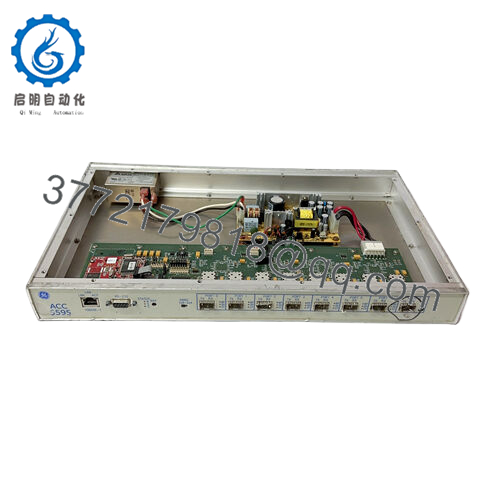
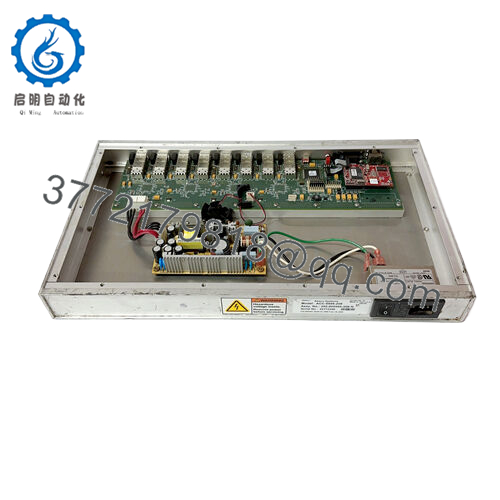
 WhatsApp: +86 16626708626
WhatsApp: +86 16626708626 Email:
Email:  Phone: +86 16626708626
Phone: +86 16626708626